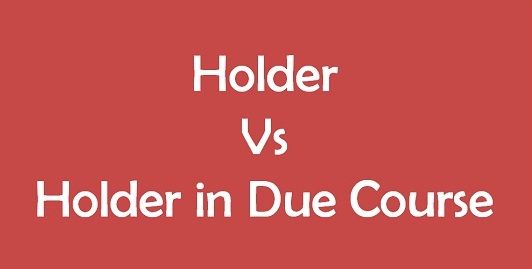Table of Contents
Difference between holder and holder in due course
Meaning of Holder
- Section 8 of Negotiable Instruments Act 1881 defines the term Holder. A Holder is a person who is entitled in his own name to the possession of a negotiable instrument to receive and recover the amount due on the instrument.
- A holder is a person who lawfully obtains the negotiable instrument. The negotiable instrument has his name entitled on it so he can receive the payment from the parties liable.
- A holder may or may not be in possession of the instrument.
- If the title of the prior party is defective and does not have a legal right to deliver the instrument to the holder, the holder also has no such right.
- Holder is entitled to the possession of the instrument in his own name.
- Consideration is not necessary
- A holder does not have a right to sue prior parties related to the transaction
- The holder may or may not obtain the instrument in good faith(with Bonafide intentions).
- A person can become a holder either before or after the maturity of the negotiable instrument.
Kinds of Holder
- De Jure – It means that the holder of a negotiable instrument as a matter of legal right.
- De facto – It means the holder of a negotiable instrument by the virtue of possession but not entitled in his/her own name.
Meaning of Holder in Due Course
- Holder in due course means a person who has the possession of the instrument.
- A holder in due course is a person who acquires the negotiable instrument (in good faith) for some consideration, whose payment is still due.
- Always in the possession of the instrument.
- Holder in due course is free from the defective title of prior party.
- Holder has to obtain it in good faith for some consideration.
- Consideration is necessary.
- A holder in due course has a complete right to sue the prior parties.
- The holder in due course always obtains the instrument in good faith (with bonafide intentions).
- A person can become holder in due course only before the maturity of negotiable instrument.
Differences between Holder and Holder in Due Course
| Basis | Holder | Holder in due course |
| Meaning | A holder is a person who lawfully obtained the negotiable instrument. The negotiable instrument has his name entitled on it so he can receive the payment from the parties liable. | A holder in due course is a person who acquires the negotiable instrument (in good faith) for some consideration, whose payment is still due. |
| Possession | May or May not be in possession of the instrument. | Always in the possession of the instrument. |
| Title | If the title of the prior party is defective and does not have a legal right to deliver the instrument to the holder, the holder also has no such right. | Holder in due course is free from the defective title of prior party. |
| Entitlement | Holder is entitled to the possession of the instrument in his own name. | Holder has to obtain it in good faith for some consideration. |
| Consideration | Consideration is not necessary | Consideration is necessary |
| Right to sue | A holder does not have a right to sue prior parties related to the transaction. | A holder in due course has a complete right to sue the prior parties. |
| Good Faith | The holder may or may not obtain the instrument in good faith(with bonafide intentions). | The holder in due course always obtains the instrument in good faith(with bonafide intentions) |
| Maturity of the instrument | A person can become a holder either before or after the maturity of the negotiable instrument. | A person can become holder in due course only before the maturity of negotiable instrument. |
Author: Shreya Rathor,
Bharati Vidyapeeth Deemed University, Pune, Final Year

